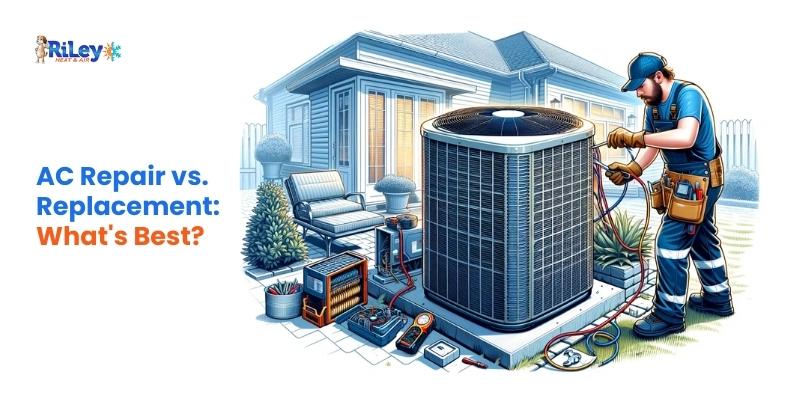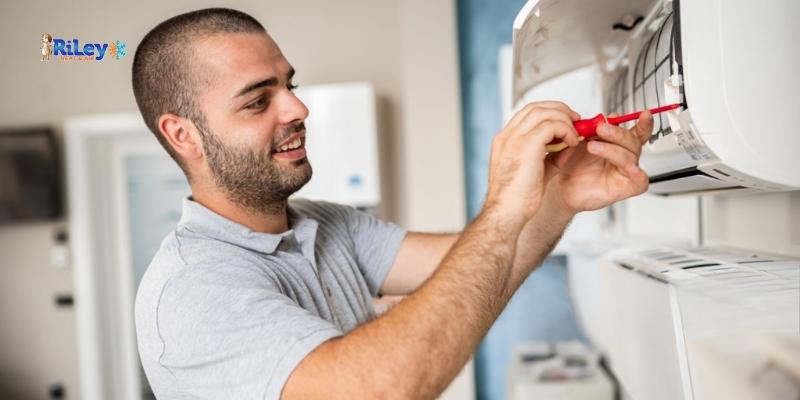
Air Conditioning Repair vs. Replacement: Which Is Right for You?
Deciding whether to repair or replace your air conditioning (AC) unit can be challenging. Factors like cost, efficiency, and the age of your current system make the right choice crucial for both comfort and financial reasons. This guide will help you weigh the pros and cons of air conditioning repair versus replacement, providing the information needed to know when to repair or replace it.
Deciding Between AC Replacement and Repair
1. Assessing the Age of Your AC Unit
One of the first factors to consider is the age of your AC unit. One of the signs your AC needs repair is its age. Most air conditioning systems have a lifespan of about 10–15 years. If your unit is nearing or has surpassed this age, it might be more cost-effective in the long run to replace it rather than continue investing in repairs.
Pros of Repairing an Older Unit
Repairing an older unit can be viable if the issues are minor and the overall system is still performing adequately. Minor AC repairs are generally less expensive than a full replacement, and they can extend the lifespan of air conditioning units for a few more years. Additionally, if you’ve maintained your unit well, it might still have some life left despite age.
Cons of Repairing an Older Unit
However, as AC units age, they become less efficient and more prone to breakdowns. Frequent repairs can add up, potentially costing more over time than a new system. Older units also lack the energy efficiency of newer models, leading to higher utility bills. If your unit is over 10–15 years old, replacing it might be a more economical and environmentally friendly choice.
2. Evaluating the Cost of Repairs

When faced with a malfunctioning AC unit, the cost of repairs is a significant factor in your decision-making process. Small issues, like replacing a capacitor or fixing a refrigerant leak, are inexpensive. However, air conditioning replacement might be the better option if the repair costs exceed 50% of the replacement cost.
Pros of Opting for AC Repairs
If the repair costs are reasonable and the unit is otherwise in good condition, fixing the issue can be cost-effective. Repairs can quickly restore your unit’s functionality, allowing you to enjoy a comfortable home without the immediate expense of a new system.
The Cons of Opting for Air Conditioning Repairs
Conversely, high repair costs can sometimes signify more significant underlying issues. Spending a substantial amount on repairs might only be a temporary fix, leading to additional repairs. Weighing the repair costs against the price of a new, more efficient unit is essential to avoid sinking money into a system on its last legs.
3. Considering Energy Efficiency
Energy efficiency is a crucial factor in the repair vs. replacement debate. Older units are generally less efficient than newer models, so they consume more energy to cool your home. Upgrading to a new, high-efficiency unit can significantly reduce your energy bills and positively impact the environment.
Pros of Energy-Efficient Air Conditioning Replacement
Newer AC units are designed to be more energy-efficient, often boasting higher SEER (Seasonal Energy Efficiency Ratio) ratings. A higher SEER rating indicates better energy efficiency, leading to lower utility bills and a reduced carbon footprint. Additionally, many modern units have advanced features like programmable thermostats and smart home integration, enhancing convenience and control over your home’s climate.
Cons of an Energy-Efficient Replacement
The upfront cost is the primary downside of replacing your AC unit with a more energy-efficient model. High-efficiency units can be expensive, and the installation costs add to the overall expense. However, the long-term savings on energy bills and potential incentives or rebates for upgrading to an energy-efficient system can offset these initial costs.
4. Analyzing the Frequency of Repairs
Frequent repairs indicate that your AC unit might be reaching the end of its useful life. If you call a technician multiple times a year, it’s time to consider a replacement seriously.
Pros of Repairing Infrequent Issues
If your AC unit has only needed occasional repairs and is generally reliable, it might still have a few good years left. Infrequent issues can often be addressed without significant expense, allowing you to delay the cost of a new unit.
Cons of Frequent Repairs
On the other hand, if your unit requires frequent repairs, these costs can quickly add up. Not only do frequent repairs strain your budget, but they can also lead to inconsistent cooling performance, reducing your home’s comfort. In such cases, replacing the unit can provide more reliable and efficient cooling, ultimately saving you money and hassle.
5. Considering the Comfort and Reliability of Your Home

The comfort and reliability of your home’s cooling system are paramount. If your current AC unit struggles to maintain a consistent temperature, produces uneven cooling, or makes excessive noise, these issues can significantly impact your quality of life.
Pros of Repairing for Immediate Comfort
Repairing your AC unit can provide immediate relief and restore comfort to your home quickly. If the issues are minor and can be fixed promptly, repairs can be quick and effective.
The Cons of Relying on an Unreliable Unit
However, relying on an aging and unreliable unit can lead to ongoing discomfort and inconvenience. Frequent breakdowns and inconsistent performance can be frustrating, especially during the hot summer. Investing in a new unit can provide peace of mind, ensuring your home remains comfortable and cool without worrying about unexpected failures.
Conclusion
Deciding between air conditioning repair and replacement involves considering several factors. While repairing an older unit can be a cost-effective short-term solution, frequent breakdowns and high energy bills might make replacement the better long-term option.
Ultimately, the right choice depends on your specific situation. Repairs might be sufficient if your unit is relatively new and has only minor issues. However, if your AC is old, inefficient, and prone to frequent problems, investing in a new, energy-efficient unit can provide greater comfort, reliability, and savings over time. Consulting with a professional HVAC maintenance and replacement company can also help you assess your unit’s condition and make the best decision for your home and budget.
Tags :







COMMENTS